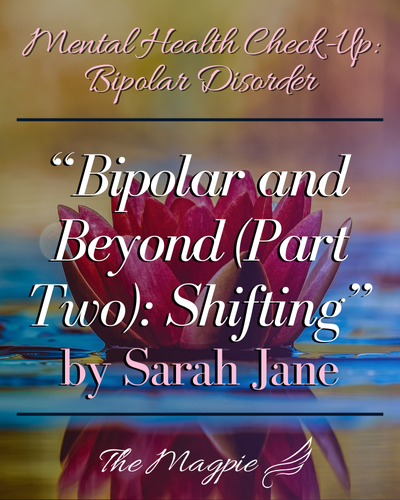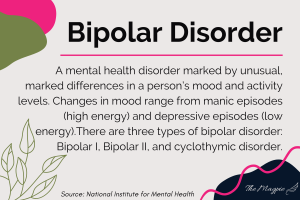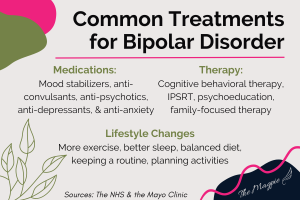
Mental Health Check-up: Bipolar Disorder (2)

Bipolar and Beyond (Part 2): Shifting
By Sarah Jane, Magpie contributor
Throughout my journey confronting bipolar disorder, hope, structure, and purpose became the hallmarks of my recovery.
Originally, I wanted to get better to keep my relationship going. Now I had a diagnosis, and with it brought fantasies of my boyfriend and I weathering the waves together, looking out to the horizon as a team.
When I brought home a pamphlet about recovery, he didn’t even look at it before tossing it across the room. I was alone: just emotionally at first, but then truly and completely as that relationship came to an inevitable end.
But it was also freeing: from that point on, anything I did, I did for me.
The doctors I saw told me that Bipolar was hard to treat, that it would hide behind the corners in my mind. So I started doing research, helping my treatment along by reading numerous books on recovery.
We began trying medication, and that was a journey in and of itself. The first few medications they tried did nothing except make me fall asleep behind the wheel of my car.
I was resolute that we keep trying different meds. I learned to advocate for myself when some doctors saw me as a number instead of a person. Through my tenacity, we ended up with a cocktail that worked. Now I felt more even, not drugged.
But it was not without side effects – I gained huge amounts of weight, so my treatment plan needed to include exercise and nutrition. I started going to the pool every morning and eating very little sugar. The weight became more manageable.
At first, I was hypervigilant about whether a feeling was a true emotion or the beginning of an episode. As I learned to journal, meditate, share with my supportive friends, and communicate with my doctor and therapist, these became easier to navigate.
It took me years of therapy to learn not to pathologize every thought or feeling I had. It is human to have emotions, and even though mine might be felt deeper than another’s, it is not always a sign of failing mental health. As Freud said, “Sometimes a cigar is just a cigar.”
 Recovery was a set of fits and starts; but in the first year of recovery, I found the first of two things that really helped me: giving back.
Recovery was a set of fits and starts; but in the first year of recovery, I found the first of two things that really helped me: giving back.
As I was looking for support groups, I found an organization called NAMI, a nonprofit with support groups, educational programs, and public speaking for adults with mental illness. I was thrilled when they offered me a job handling these programs on a county level. It gave me confidence, structure, and hope.
I eventually got sober, and the second element that changed my recovery path unfolded before me: spirituality.
At first, it was the spirituality of Western religions, and that came with 12-step programs. But I found this wanting, and too stifling for a free spirit who was raised agnostic.
I had a sense of purpose, but religion was an ill-fitting garment and I sought out more esoteric pursuits. This took me on a decades-long search for a loving, inclusive faith.
About two years ago I began leaning into Eastern philosophy, witchcraft, and quantified field theory. I found solace there. I also found empowerment and, most importantly, hope and purpose.
I’m not saying recovery is easy, nor is it linear. Even with the meds, even with therapy and work and religion and giving back, it sometimes is a hard emotional burden to bear.
But I’ve learned how to work with these fluctuations: when I’m depressed, I rest and write and journey inward. When I have hypomanic episodes, I work on projects. In both cases, I tell my doctors and support network about the changing moods in case a medication needs adjusting. I haven’t had a full-blown manic episode in a decade.
I’m now a big believer of integrating Western and Eastern religions and wellness practices. Mental illness doesn’t cut any breaks, so why not come out with the whole arsenal? I’ve learned as much from meditation as I did from scanning the DSM. Through it all, I keep my feet rooted in taking meds and following up with doctors.
It’s hard to say if I would have chosen a different life path if meds had been an option earlier. It was sometimes an excruciating road, but I know depth and heights that not everyone does. Most importantly, I am now able to help others with very specific problems.
And that, I wouldn’t change.
…‘Ableist’ language is omnipresent in conversation: making a “dumb” choice, turning a “blind eye” to a problem, acting “crazy”, calling a boss “psychopathic”, having a “bipolar” day. And, for the most part, people who utter these phrases aren’t intending to hurt anyone – more commonly, they don’t have any idea they’re engaging in anything hurtful at all.
However, for disabled people like me, these common words can be micro-assaults…
–Sara Nović, writer & deaf rights activist